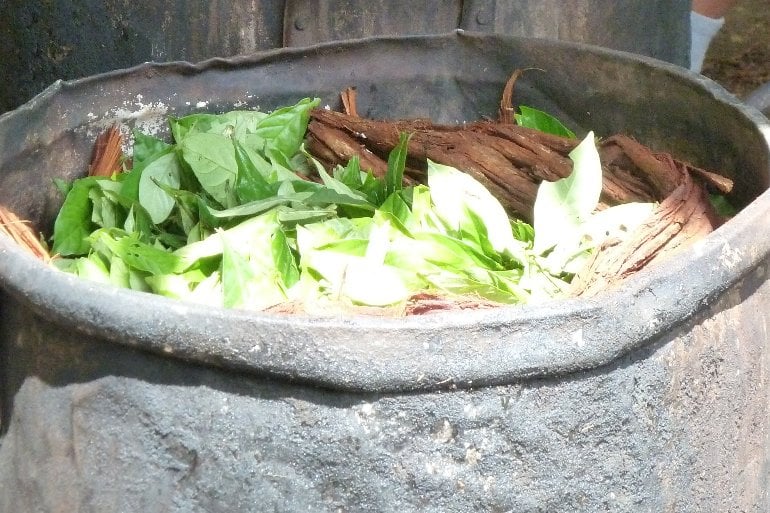Summary: Used to help treat mental health conditions, and improve spirituality, the plant-based psychoactive ayahuasca is becoming more popular. Researchers say there is a high rate of adverse physical and psychological effects from using ayahuasca although they are not generally severe.
Source: PLOS
There is a high rate of adverse physical effects and challenging psychological effects from using the plant-based psychoactive ayahuasca, though they are generally not severe, according to a new study by Daniel Perkins of University of Melbourne, Australia, and colleagues published this week in the open-access journal PLOS Global Public Health.
Ayahuasca is a South American psychoactive brewed drink used in traditional medicine and ceremony. Its contemporary use has been expanding throughout the world for mental health purposes and for spiritual and personal growth. Although clinical trials and observational studies have examined the potential benefits of ayahuasca, few have analyzed its adverse effects.
In the new study, the researchers used data from an online Global Ayahuasca survey carried out between 2017 and 2019, involving 10,836 people from more than 50 countries who were at least 18 years old and had used ayahuasca at least once. Information on participants’ age, physical and mental health and history and context of ayahuasca use was collected.
Overall, acute physical health adverse effects were reported by 69.9% of the sample, with the most common effects being vomiting and nausea (68.2% of participants), headache (17.8%) and abdominal pain (12.8%). Only 2.3% of participants reporting physical adverse events required medical attention for this issue.

Among all participants, 55% also reported adverse mental health effects, including hearing or seeing things (28.5%), feeling disconnected or alone (21.0%), and having nightmares or disturbing thoughts (19.2%).
However, of all respondents identifying these mental health effects, 87.6% believed they were completely or somewhat part of a positive growth process.
The researchers also identified several factors that predispose people to the adverse physical events, including older age, having a physical health condition or substance use disorder, lifetime ayahuasca use and taking ayahuasca in a non-supervised context.
The authors make the observation that ayahuasca has notable, although rarely severe, adverse effects according to the standards used for assessing prescription medicines.
In that sense, they state that ayahuasca practices can hardly be assessed with the same parameters used for prescription medicines, since the myriad of its effects include challenging experiences that are intrinsic to the experience, some of which are considered as part of its healing process.
The authors add, “Many are turning to ayahuasca due to disenchantment with conventional Western mental health treatments; however, the disruptive power of this traditional medicine should not be underestimated, commonly resulting in mental health or emotional challenges during assimilation. While these are usually transitory and seen as part of a beneficial growth process, risks are greater for vulnerable individuals or when used in unsupportive contexts.”
About this neuroscience research news
Author: Press Office
Source: PLOS
Contact: Press Office – PLOS
Image: The image is in the public domain
Original Research: Open access.
“Adverse effects of ayahuasca: Results from the Global Ayahuasca Survey” by José Carlos Bouso et al. PLOS Global Health
Abstract
Adverse effects of ayahuasca: Results from the Global Ayahuasca Survey
Introduction
Ayahuasca is a plant-based decoction native to Amazonia, where it has a long history of use in traditional medicine. Contemporary ritual use of ayahuasca has been expanding throughout the world for mental health purposes, and for spiritual and personal growth. Although researchers have been conducting clinical trials and observational studies reporting medical and psychological benefits, most of these do not report ayahuasca’s immediate or medium-term adverse effects, so these are underrepresented in the literature. With the expansion of ayahuasca ceremonies from their traditional contexts to countries around the world, there is an important public health question regarding the risk/benefit balance of its use.
Methods
We used data from an online Global Ayahuasca Survey (n = 10,836) collected between 2017 and 2019 involving participants from more than 50 countries. Principal component analysis was performed to assess group effects. Logistic regression analysis was performed to test for adverse effects associated with history of ayahuasca use, clinical, context of use and spiritual effect variables.
Results
Acute physical health adverse effects (primarily vomiting) were reported by 69.9% of the sample, with 2.3% reporting the need for subsequent medical attention. Adverse mental health effects in the weeks or months following consumption were reported by 55.9% of the sample, however, around 88% considered such mental health effects as part of a positive process of growth or integration. Around 12% sought professional support for these effects. Physical adverse effects were related to older age at initial use of ayahuasca, having a physical health condition, higher lifetime and last year ayahuasca use, having a previous substance use disorder diagnosis, and taking ayahuasca in a non-supervised context. Mental health adverse effects were positively associated with anxiety disorders; physical health conditions; and the strength of the acute spiritual experience; and negatively associated with consumption in religious settings.
Conclusions
While there is a high rate of adverse physical effects and challenging psychological effects from using ayahuasca, they are not generally severe, and most ayahuasca ceremony attendees continue to attend ceremonies, suggesting they perceive the benefits as outweighing any adverse effects. Knowing what variables might predict eventual adverse effects may serve in screening of, or providing additional support for, vulnerable subjects. Improved understanding of the ayahuasca risk/benefit balance can also assist policy makers in decisions regarding potential regulation and public health responses.






